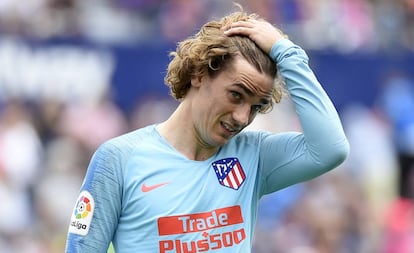Griezmann: The right moment
The news that the French forward would be leaving in the run up to the summer market is the best possible scenario, both for Atlético and for the player himself

When it’s time to plan a season as a sporting director, over time you develop a sixth sense that helps you to predict the movements in the market, both in favor and against the interests of your club. There are always certain things that you can imagine, such as when one of your players has had a great year in a smaller league and is seducing the big European teams. You inevitably prepare for a scenario of negotiations that combines the economic and sporting benefits of such a transfer in the best way. In that case, the most important thing is to have sufficient room for maneuver to rearrange the squad.
If a club from La Liga wants to sign a player in English, it has to go through the wearing process of a never-ending negotiation
But in Spain there is a factor that does considerable damage to the clubs from La Liga compared to other European competitions: the existence of release clauses. They are a legal concept that was originally designed to allow teams to protect their players, but that in practice makes them vulnerable to setbacks. What’s more, this is something that has allowed the Premier League to take control of the market, thanks to its economic boom. If an English club sets its sights on a target in Spanish soccer, it will go for it by paying the release clause. But if a club from La Liga wants to sign a player in English, it has to go through the wearing process of a never-ending negotiation with an opposite number who normally doesn’t even need to sell.
Taking into account these constraints in Spanish soccer, I believe that the news of Griezmann’s departure in the run-up to the summer market is the best possible scenario for Atlético and for the player himself. In the heat of the moment, fans tend to feel rejected when a player leaves, but looking at the situation with a bit of perspective, we are talking about a player who has offered high-level performance over five years and has shown loyalty to the club when he could have left in the midst of the FIFA sanction two years ago or after having won the World Cup with France last summer. If his mind was made up this time around that his stay at the club had reached its end and that he counted on pretenders who were willing to pay the release clause on July 1, when it fell from €200 million to €120 million, it seems to me to be the best moment for everyone.
The Neymar case represented a before-and-after moment in the transfer market
It would have been worse for the clause to have been paid on July 1 with no prior notice, thus leaving the club without any room for maneuver to react in the market. Atlético de Madrid is an institution that has grown a huge amount, it has enough magnetism to seduce players, and doesn’t need to convince anyone. And in this case it is positive that it has been announced early for the common good, for the fans and for the club, so that the appropriate movements can begin this summer to reconfigure the squad taking into account the departures of a number of players, not just Griezmann. From my point of view, the process has taken place appropriately, while the methods perhaps have not been adequate. I take a classical approach, and when it comes to farewells I would always prefer a joint press conference rather than a video or a documentary, something that can always be interesting but that can rob a club and its fans of its more emotional moments.
A few years ago, any Spanish team would have been caught off guard if a club paid out more than €100 million to terminate a player’s contract, when now it seems like the most natural thing in the world. But the parameters of the market have changed since the Neymar case, which represented a before-and-after moment. No one expected that a club like PSG would pay a release clause that was as high as €222 million. The fact that it happened at the beginning of August seriously damaged Barça’s planning, with no guarantees and a marketplace with sky-high prices: €145 million for Dembélé and €160 million for Coutinho. A precedent that served as a lesson for many clubs of the need to cover their backs and avoid surprises, as Atlético has just done with Griezmann.
English version by Simon Hunter.
Tu suscripción se está usando en otro dispositivo
¿Quieres añadir otro usuario a tu suscripción?
Si continúas leyendo en este dispositivo, no se podrá leer en el otro.
FlechaTu suscripción se está usando en otro dispositivo y solo puedes acceder a EL PAÍS desde un dispositivo a la vez.
Si quieres compartir tu cuenta, cambia tu suscripción a la modalidad Premium, así podrás añadir otro usuario. Cada uno accederá con su propia cuenta de email, lo que os permitirá personalizar vuestra experiencia en EL PAÍS.
¿Tienes una suscripción de empresa? Accede aquí para contratar más cuentas.
En el caso de no saber quién está usando tu cuenta, te recomendamos cambiar tu contraseña aquí.
Si decides continuar compartiendo tu cuenta, este mensaje se mostrará en tu dispositivo y en el de la otra persona que está usando tu cuenta de forma indefinida, afectando a tu experiencia de lectura. Puedes consultar aquí los términos y condiciones de la suscripción digital.









































